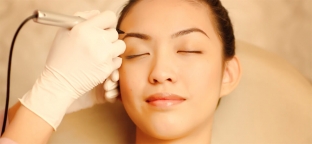Some people think that permanent makeup – The best way to become beautiful is by investing once. Yes, of course, with age, facial features become more blurred and not so bright. However, with an inept master and the wrong approach, you have every chance of turning into an aged doll. Therefore, given the increased popularity of permanent makeup over the past decade, we could not help but mention it. After all, the tattoo procedure has a number of contraindications, which some masters forget to warn about and many clients do not know about.
What is permanent makeup or tattooing?
In order to understand the nuances, let's understand for ourselves what the procedure itself is.
Basically – this is the same tattoo, only not on such a deep level as its classical version is done. Most often it is used to emphasize or correct the shape of facial features.
That's why they usually do:
- eyebrow tattoo,
- tattoo lips,
- eyelid tattoo or eyelash tattoo.
To understand if you are ready for such a procedure, just ask yourself, do you want to go with the same make-up for several years in a row? If the answer is yes, then this procedure is for you.
But first I would like to note that any intervention that involves needles carries a risk. And you should be warned about these risks even before the procedure. But, unfortunately, unscrupulous masters for some reason "forget" to do this. First of all, this concerns the fact that tattooing has many contraindications. Therefore, we decided to tell you about them.

Contraindications for permanent makeup procedure
Today, there are two types of contraindications to tattooing. The first type includes contraindications, in which people are strictly forbidden to do permanent makeup. To the second – those in the presence of which it is undesirable to carry out the procedure. It should be noted that under certain conditions, contraindications of the second type cease to be an obstacle to the procedure.
Who is strictly forbidden to get a tattoo?
This procedure is prohibited for the following patients who:
- psoriasis;
- complex forms of diabetes mellitus;
- chronic diseases in the acute stage;
- severe diseases of the internal organs, including kidney and liver failure;
- poor blood clotting;
- HIV and AIDS;
- psychiatric disorders and epilepsy;
- state of drug or alcohol intoxication;
- oncological diseases;
- autoimmune diseases;
- allergic reactions.
Minority can also be considered a contraindication. In the same way as tattooing, permanent tattooing is prohibited for persons under the age of 18.
Undesirable symptoms for a tattoo procedure
It is worth temporarily postponing the permanent makeup procedure if you experience:
- feeling unwell, SARS and acute respiratory infections, fever,
- exacerbation of acne and inflammatory processes on the skin,
- are taking strong drugs,
- there are moles, papillomas and warts at the site of the intended makeup application,
- herpes in the acute stage.
- conjunctivitis,
- pregnancy and lactation,
- period of menstruation,
- Plastic surgery at the site of the intended application of permanent makeup.
It should be noted that if any of these factors disappear and there are no other contraindications, the procedure becomes possible.
How to take care of your skin after getting a tattoo
Naturally, during the tattooing procedure on the area of the eyebrows, eyes or lips, the skin is damaged. She needs time to fully recover.
To keep the applied pigment even and the applied shape not damaged, do not scratch the area of the coating or peel off the skin crust during healing.
The specialist can also recommend chlorhexidine-based antiseptics or various creams to speed up the healing of skin lesions. Also, for a while, you need to give up peeling procedures, as well as visiting baths, saunas, etc.
What do you think about permanent makeup, share your experience on estet-portal.com






Add a comment